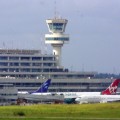(CNN)A fuel crisis, corruption claims and even a shortage of tomatoes: Nigeria has made headlines for all the wrong reasons lately, and the streak of disappointing news seems to continue, as United Airlines cancelled its daily flight from Houston to Lagos due to weakness in the energy sector and the ongoing difficulties in collecting money from tickets sold in Nigeria.
For some months, Nigeria has been restricting the amount of money that can be moved abroad after the global slump in oil prices wiped out the government's U.S. currency reserves. The country owes airlines close to $600 million in airfares, according to the International Air Transport Association.
Africa's most populated country with about 173 million people, Nigeria is also the biggest oil exporter in Africa, with the largest natural gas reserves on the continent. But that hasn't helped pull the country out of its economic slump as it's never had enough refining capacity, and now has too few dollars to import more gas into the country.
Corruption and hope
While this all sounds like doom and gloom for Nigeria, there is one group finding some positive out of the current climate: entrepreneurs.
A combination of power shortages, a fuel crisis and a currency that's lost half its value has meant that suddenly "everyone became much poorer in international comparison," explained Mark Essien, CEO of Hotels.ng, Nigeria's largest hotel booking site.
While Essien agrees that in the last year the situation in Nigeria economically has become "significantly worse", it isn't all terrible. "The good news for us specifically as a company, and for other companies in similar situations, is that because our capital comes from outside the country, the dollars we have are reaching much, much further. For example, a salary we used to pay of N100,000, which was $625, is now costing us (just) $285. So we are able to achieve much more with our capital," said the entrepreneur.
"We have expanded our hiring and added more people to do more work, because we can achieve a lot more now with this," he said.
Perfect time for growth
Essien said that for companies who export software, the production costs have dropped significantly, so it has made more sense to hire people in production and development. Software sold abroad now is generating "significantly more returns locally".
"So generally the opinion in the business community is that with prices dropping, this is the right time to invest in production and building," said Essien, encouraging other Nigerian entrepreneurs.
Eseoghene Odiete, a fashion entrepreneur based in Lagos and creative director of Hesey Designs, agrees. She said it's cheaper to hire employees and retain them. There are positive side effects for the company she founded in 2012: "Local patronage has increased. Nigerians are looking inwards to purchase items they would otherwise have gotten from other countries," she said, citing the exchange rate and shipping costs as the reason.
"A lot of companies that import corporate souvenirs (such as bags and folders) would rather produce here in our local factories. They are aware our quality is also great but have ignored that until now," said Odiete.
Many companies who produce locally are doing quite well, agrees Feyi Fawehinmi a Nigerian accountant based in London. "You find all of a sudden people can't afford something foreign and they have to look locally," he said, mentioning some food businesses, including honey, dried fruits, oats and cashews who are experiencing growth.
Furthermore, Odiete cites a "very strong creative movement" happening in Nigeria. "Every young person is expressing themselves now instead of waiting for a job," she said, adding that she also runs a training institute for aspiring entrepreneurs. "Our numbers in terms of students we train have really gone up."
Continued hope
In May, British Prime Minister David Cameron described Nigeria as "fantastically corrupt" in comments before an anti-corruption summit in London which included Nigerian president Muhammadu Buhari -- who has built his reputation on being less tolerant of the corruption which has plagued Nigeria for years. Buhari said last week said his government has recovered $9.1 billion in missing assets and funds as part of its anti-corruption drive.
Fawehinmi added that while economically the situation in Nigeria is "bleak", corruption is getting better under President Buhari. "It's almost unprecedented in Nigerian history," he said of the fact that the government is recovering money. "You have to give him (Buhari) credit for that."



















